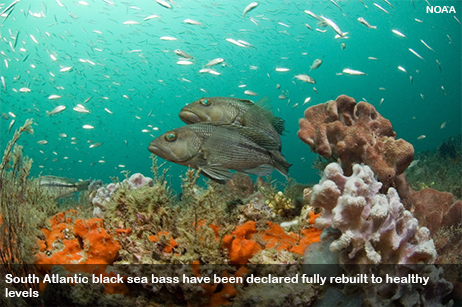More Good News for U.S. Ocean Fish
The National Oceanic and Atmospheric Administration's Fisheries Service, or NOAA Fisheries, released the "2013 Report on the Status of U.S. Fisheries" to Congress on April 29. The report shows how efforts by the agency, fishery management councils, and stakeholders—including fishermen and conservationists—are working to prevent the problem of catching fish faster than they can reproduce (also known as overfishing) and rebuild depleted fish populations.

The NOAA Fisheries report also offers some continued good news, on a number of fronts, for U.S. ocean fish populations:
- South Atlantic black sea bass and Sacramento River fall Chinook (also known as king) salmon were declared fully rebuilt to healthy levels last year—bringing the number of fish populations that have been rebuilt since 2000 to a total of 34.
- Overfishing ended on seven stocks during 2013, including South Atlantic red grouper and Gulf of Mexico greater amberjack. Six stocks were added, however, for a net gain of one. This translates to a total of 28 stocks currently subject to overfishing in U.S. waters.
- The population size of four stocks, including Pacific Coast cowcod, have improved to such an extent that they are no longer classified as overfished, but three have been added, for a net gain of one.
We wouldn't be able to celebrate these success stories without the strong conservation provisions of the primary law governing U.S. ocean fish management—the Magnuson-Stevens Fishery Conservation and Management Act. But all this hard-earned progress could be jeopardized by proposed federal legislation that would weaken existing requirements to establish science-based fishing levels that do not allow overfishing and to rebuild depleted fish populations. It would also put short-term economic considerations before long-term economic sustainability.
Congress recently started considering how it will reauthorize, or revise, the Magnuson-Stevens Act. Unfortunately, Rep. Doc Hastings (R-WA), chairman of the House Natural Resources Committee, has put forth draft legislation that would significantly weaken the law—a proposal that some are calling the "Empty Oceans Act."
Congress should reject Hastings' proposal and look to the future, not take us back to the days when politics trumped sound science and the long-term health of our oceans was shortchanged.
Rather than weaken the law, we should build upon the successes of the Magnuson-Stevens Act by adopting ecosystem-based fisheries management policies to help ensure sustainable U.S. fisheries and promote healthy oceans. Pursuing this approach would help us protect habitat, avoid the incidental catching and killing of ocean wildlife while fishing for popular food and recreational species (also known as bycatch), and conserve the small fish that are integral to the ocean food web (also known as forage fish). Lastly, it would also help us tackle complex threats facing our oceans such as climate change and ocean acidification that are affecting fish and shellfish populations.
The transition to ecosystem-based fisheries management is supported by NOAA Fisheries, which stated in the 2013 Status of Stocks report summary that, "It is also increasingly important that we better understand ecosystem and habitat factors, as resilient ecosystems and habitats form the foundation for robust fisheries and fishing jobs."
I hope that federal policy makers will keep sight of the widespread benefits of vibrant fisheries and healthy ocean ecosystems as they move forward with efforts to reauthorize the Magnuson-Stevens Act. As the new Status of the Stocks report shows, we're making progress but there's more work to be done.
Ted Morton directs The Pew Charitable Trusts' efforts to establish policies to end overfishing, rebuild depleted fish populations, and promote ecosystem-based fisheries management in U.S. federal waters.











